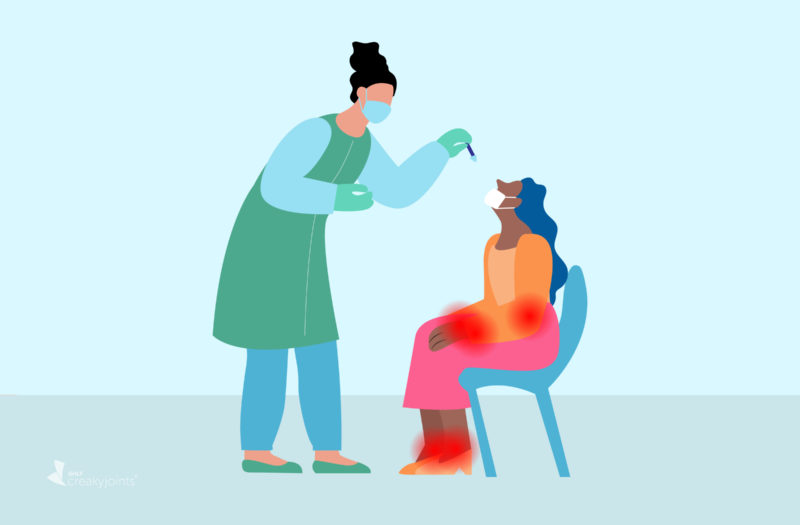Learn more about our FREE COVID-19 Patient Support Program for chronic illness patients and their loved ones.
Since the COVID-19 pandemic began, people with autoimmune or inflammatory diseases have been wondering whether they’re at higher risk for contracting the virus or developing serious complications from it that generally heathy people. According to the latest information from the U.S Centers for Disease Control and Prevention (CDC), having a medical condition such as cancer, chronic kidney disease, diabetes, or heart disease certainly places you in this high-risk category, as does being an organ transplant recipient. Notably absent from this list: people who have autoimmune or inflammatory rheumatic diseases, such as rheumatoid arthritis (RA).
RA patients clearly have issues with immune system function, plus many take medications that weaken their immune system. While these problems suggest that RA patients would be extra vulnerable to COVID-19, study results have been mixed. Now new research published in the journal Arthritis & Rheumatology finds that some extra vigilance is warranted.
For the study, researchers reviewed the medical records of 33,886 rheumatoid arthritis patients in the Veterans Health Administration (VHA) database and compared them against the records of 33,886 people without RA. The study period spanned from January 2020 through early December 2020.
According to the findings, rheumatoid arthritis patients were 25 percent more likely than non-RA patients to develop COVID. People with RA were also 35 percent more likely to be hospitalized from COVID-19 than people without RA.
“This increased risk is comparable to what we see with other chronic conditions like diabetes, heart disease, and lung disease,” says lead author Bryant England, MD, PhD, Assistant Professor in the Division of Rheumatology and Immunology at the University of Nebraska Medical Center. “We’ve known for a while that RA patients are at higher risk for infections in general, especially if they have high disease activity, because of the immune dysregulation that accompanies rheumatoid arthritis. Taking biologics, disease-modifying drugs, and glucocorticoids may also contribute to that risk.”
Why did this study find a significant link between RA and COVID severity whereas some others did not? Size is one factor, as Dr. England’s study was larger than many others on the topic. The study design also played a role.
“A lot of other studies have evaluated people who tested positive and then looked at the disease course,” he explains. “Ours was different in that we took people who were at risk of developing the disease, followed them up to getting it, and then followed them to learn about the severity.”
The key takeaway, he says, is that people with rheumatoid arthritis should consider themselves more susceptible to COVID than the general population. Getting vaccinated should be a priority. He adds that it’s important to talk to your health care provider before rolling up your sleeve, as you might need to pause your medication in order to increase your odds of having a robust immune response to the vaccine.
However, do not stop taking your RA medication without discussing it with your doctor. The American College of Rheumatology does not recommend that most medications be stopped, but rather a select few, based on what evidence shows so far about their impact on vaccine effectiveness. You can read more about the ACR guidance here, but the RA medications that may require a change in timing include:
- Methotrexate
- JAK inhibitors
- Abatacept
- Rituximab
It may also be important for people who are immunocompromised — such as those with RA — to continue to take precautions after being vaccinated, as immunosuppressant medications may reduce the effectiveness of the vaccine.
Get Free Coronavirus Support for Chronic Illness Patients
Join the Global Healthy Living Foundation’s free COVID-19 Support Program for chronic illness patients and their families. We will be providing updated information, community support, and other resources tailored specifically to your health and safety. Join now.
England BR, et al. Risk of COVID-19 in Rheumatoid Arthritis: A National Veterans Affairs Matched Cohort Study in At-Risk Individuals. Arthritis & Rheumatology. May 5, 2021. doi: https://doi.org/10.1002/art.41800.
Interview with Bryant R. England, MD, PhD, Assistant Professor, Division of Rheumatology and Immunology, University of Nebraska Medical Center
People with Certain Medical Conditions. COVID-19. U.S. Centers for Disease Control and Prevention. May 13, 2021. https://www.cdc.gov/coronavirus/2019-ncov/need-extra-precautions/people-with-medical-conditions.html.






